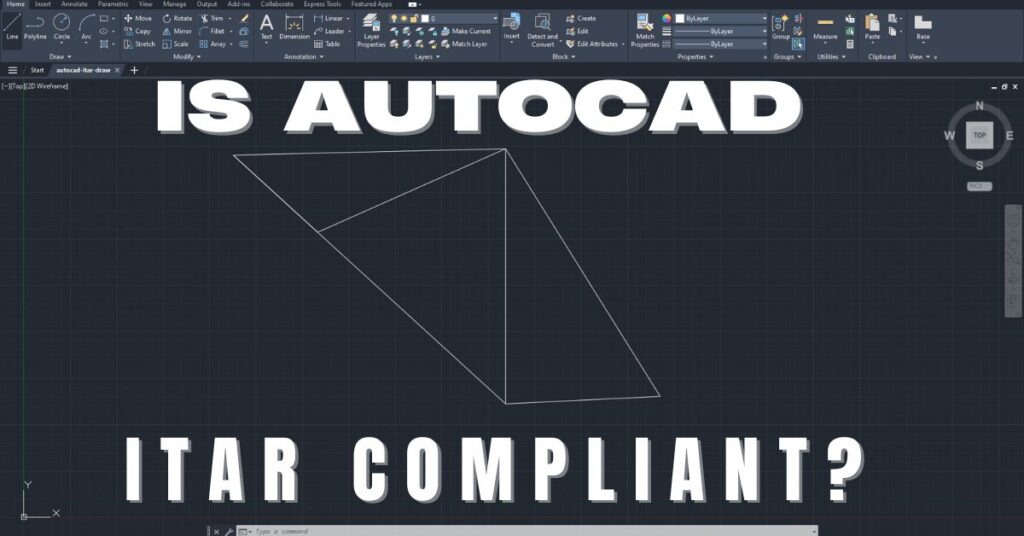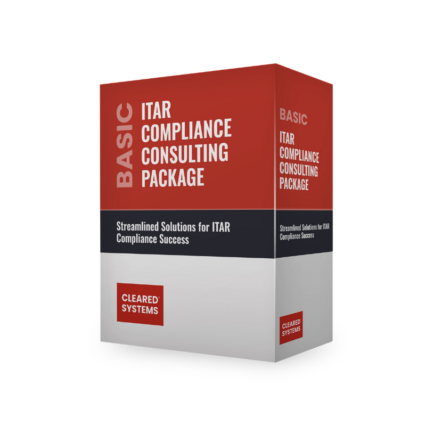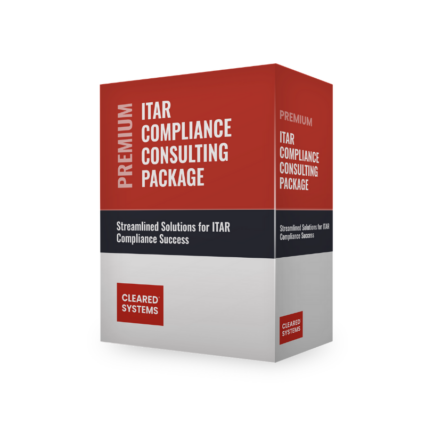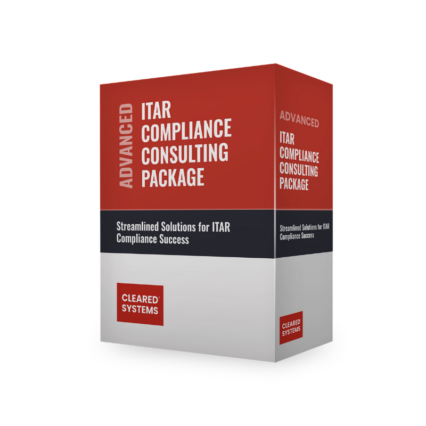ITAR Compliance: A Comprehensive Guide
At Cleared Systems we understand the importance of ITAR compliance for businesses working in the defense industry. The International Traffic in Arms Regulations (ITAR) are a set of United States government regulations that control the export and import of defense-related articles, services, and technical data. In this comprehensive guide, we will cover everything you need to know about ITAR compliance, including its history, key regulations, and best practices to ensure your business is fully compliant.
History of ITAR
The ITAR was first implemented in 1976 as part of the Arms Export Control Act. It was established to control the export and import of defense-related items and services in order to maintain national security and foreign policy objectives. Since its inception, the ITAR has undergone several revisions, including the most recent revision in 2020. This update introduced several changes, including the addition of certain encryption items to the US Munitions List (USML), which means they are now subject to ITAR regulations.
Key ITAR Regulations
The International Traffic in Arms Regulations (ITAR) is a set of complex and comprehensive rules governing the export and import of defense articles, services, and technical data. The primary objective of ITAR is to ensure that military technology and defense-related information are safeguarded from unauthorized access and transfer to foreign entities, individuals, companies, or governments.
One of the fundamental principles of ITAR regulations is that only U.S. citizens are allowed to access the items listed on the United States Munitions List (USML). This means that non-U.S. citizens are prohibited from accessing, using, or sharing technical data related to defense articles without proper authorization from the U.S. Department of State.
However, complying with ITAR regulations can be a significant challenge for many U.S. companies, especially those with overseas operations. For instance, a U.S.-based company operating overseas cannot share ITAR technical data with locally hired employees without obtaining State Department authorization. Similarly, when working with non-U.S. subcontractors, U.S. companies must ensure compliance with ITAR regulations.
To address these challenges, the U.S. government has established specific exemptions to the ITAR rules. For example, certain countries, such as Australia, Canada, and the United Kingdom, have standing agreements with the U.S. that apply to ITAR.
Moreover, U.S. companies are required to implement and maintain a documented ITAR compliance program that includes tracking, monitoring, and auditing of technical data. It is also recommended that each page of technical data be tagged with an ITAR notice or marker to prevent accidental sharing of controlled information with unauthorized users.
Non compliance with ITAR regulations can result in severe penalties, including heavy fines and damage to a company’s reputation and brand. It can also lead to the loss of business to a competitor that complies with ITAR regulations.
Summary
- Registration: All businesses that manufacture or export defense articles, services, or technical data must register with the Directorate of Defense Trade Controls (DDTC). Failure to register can result in civil or criminal penalties.
- Licensing: All exports of defense articles, services, or technical data require a license from the DDTC. The licensing process can be lengthy and requires a detailed understanding of the ITAR regulations.
- Compliance Programs: It is recommended that businesses develop and implement compliance programs to ensure they are fully compliant with the ITAR regulations. This includes training employees on ITAR regulations, conducting internal audits, and documenting compliance efforts.
Who Needs To Follow ITAR Compliance?
To protect the export and import of defense-related articles, services, and technical data related to national security, the following organizations must register with DDTC and are subject to audits.
- U.S. Manufacturers: All U.S. manufacturers of defense articles and services must comply with ITAR regulations. This includes the development, production, testing, and sale of military equipment, components, and software.
- Exporters: Any company or individual who exports defense articles or services outside the United States must comply with ITAR regulations. This includes the shipment of military equipment, technical data, and software.
- Foreign Companies and Governments: Foreign companies and governments that receive defense articles, services, or technical data from the United States must comply with ITAR regulations. They must also obtain approval from the U.S. Department of State before transferring the materials to any third-party.
- U.S. Government Agencies: All U.S. government agencies involved in the development, production, or export of defense-related materials and services must comply with ITAR regulations.
- Researchers: Individuals and organizations involved in defense-related research and development must comply with ITAR regulations. This includes the development of software and other technical data used in military applications.
- Defense Contractors: All companies that contract with the U.S. government to provide defense-related goods and services must comply with ITAR regulations. This includes subcontractors and suppliers who provide components and services to the primary contractor.
- Defense Consultants: Any individual or company that provides consulting services related to defense articles or services must comply with ITAR regulations. This includes providing advice on the development, production, and export of military technology.
Summary
Penalties for Non-compliance
ITAR compliance is essential for companies engaged in the manufacture, export, or import of defense articles or services. Noncompliance with ITAR regulations can lead to severe consequences, including heavy fines, criminal penalties, and damage to a company’s reputation and brand. Here are 6 most common penalties for ITAR compliance violations:
- Civil Penalties: The U.S. government can impose civil penalties on companies that violate ITAR regulations. Civil penalties can range from $500 to $1 million per violation. The penalty amount depends on the severity and scope of the violation.
- Criminal Penalties: ITAR violations can also result in criminal penalties, including imprisonment and fines. Willful violations of ITAR regulations can result in up to 20 years in prison and fines of up to $1 million per violation.
- Debarment: Companies that violate ITAR regulations may also face debarment from government contracts. Debarment can last for a specified period and can have a severe impact on a company’s revenue and operations.
- Loss of Export Privileges: The U.S. government can revoke a company’s export privileges for violating ITAR regulations. Loss of export privileges can prevent a company from exporting its products and services to foreign markets, resulting in a significant loss of revenue and market share.
- Reputational Damage: Noncompliance with ITAR regulations can damage a company’s reputation and brand. This can result in lost business opportunities, decreased customer loyalty, and a damaged corporate image.
- Legal Fees and Costs: Companies that violate ITAR regulations may also face legal fees and costs associated with defending against civil or criminal charges. These costs can be substantial and can further impact a company’s finances.
Summary
The penalties for ITAR compliance violations are severe and can have significant consequences for companies engaged in the manufacture, export, or import of defense articles or services. It’s crucial for companies to establish and maintain a robust ITAR compliance program to avoid potential violations and penalties.
Export and Import of Defense Articles
The International Traffic in Arms Regulations (ITAR) govern the export and import of defense articles and services. The ITAR defines defense articles as any item or technical data that is specifically designed, developed, configured, adapted, or modified for use in military applications. Here are some examples of defense articles:
- Firearms: This includes any type of weapon that fires a projectile by using an explosive or propellant charge, including rifles, handguns, shotguns, and machine guns.
- Ammunition: This includes any type of ammunition designed or adapted for use in firearms or other military applications, including bullets, shells, and explosives.
- Military Vehicles: This includes tanks, armored personnel carriers, and other vehicles designed or adapted for military use.
- Electronic Equipment: This includes any type of electronic equipment designed or adapted for military use, such as radars, navigation systems, and communications equipment.
- Chemicals: This includes any type of chemical or compound used for military applications, such as explosives, propellants, and toxic substances.
- Missiles and Rockets: This includes any type of missile or rocket designed or adapted for military use, such as guided missiles, intercontinental ballistic missiles, and surface-to-air missiles.
- Night Vision Equipment: This includes any type of equipment that enhances or amplifies night vision, such as night vision goggles and scopes.
- Drones: This includes any type of unmanned aerial vehicle (UAV) designed or adapted for military use, such as reconnaissance drones and attack drones.
- Training Equipment: This includes any type of equipment designed or adapted for military training purposes, such as simulators and virtual reality training systems.
- Technical Data: This includes any information related to the design, development, production, or use of defense articles, such as blueprints, schematics, and manuals.
The number of export transactions involving defense articles and services can vary widely depending on the nature of the products and the needs of the recipient countries. However, regardless of the number of export transactions, it is critical to ensure that each transaction complies with ITAR regulations and the specific license requirements issued by the DDTC. It’s also essential to note that ITAR regulations are subject to change, and companies engaged in the export or transfer of defense articles and services should stay up to date on any changes to the regulations to ensure ongoing compliance.

Securing ITAR Information and Data
Securing ITAR data requires a comprehensive approach that involves technical and non-technical measures. Here are some technical ways to secure your ITAR data:
- Data Encryption: Encrypting ITAR data is an effective way to protect it from unauthorized access. Encryption involves converting data into a coded form that can only be read with the proper decryption key. Encryption should be used for all ITAR data stored on devices or transmitted over networks.
- Access Control: Controlling access to ITAR data is crucial to prevent unauthorized access. This can be achieved through access controls, such as user authentication, role-based access control, and access permissions. Access control measures should be implemented for all ITAR data stored on devices and networks.
- Firewall Protection: A firewall is a network security device that monitors and filters incoming and outgoing network traffic. Firewalls can be configured to block unauthorized access to ITAR data and prevent malware and other security threats from entering the network.
- Data Backup: Data backup is an essential measure to ensure the availability and integrity of ITAR data. Regular backups should be taken of all ITAR data and stored securely in an offsite location to prevent data loss due to system failure, natural disasters, or other events.
- Anti-Malware Protection: Anti-malware software is an essential tool for protecting ITAR data from malware and other security threats. Anti-malware software should be installed on all devices used to store or access ITAR data, and should be updated regularly to ensure the latest protection against emerging threats.
- Secure Remote Access: Remote access to ITAR data should be strictly controlled and secured to prevent unauthorized access. This can be achieved through secure remote access tools, such as virtual private networks (VPNs), multi-factor authentication, and session time limits.
Summary
Securing ITAR data requires a combination of technical and non-technical measures. Companies should implement a comprehensive security strategy that includes encryption, access control, firewall protection, data backup, anti-malware protection, and secure remote access to ensure the protection and integrity of ITAR data.
Understanding ITAR’s “See Through” Rule
One of the key components of ITAR is the “See Through” Rule, which was implemented in 2014. The “See Through” Rule requires companies involved in the export of defense articles to identify and report all parties involved in a transaction, including any foreign persons or entities that may have access to the defense articles or technical data. The rule is intended to enhance the U.S. government’s ability to monitor the flow of sensitive military technologies and prevent their unauthorized transfer to foreign entities or adversaries.
The “See Through” Rule requires exporters to submit detailed transactional information to the U.S. government, including the identities of all parties involved, the export license number, and the ultimate end-use and end-user of the defense article or technical data. The rule applies to both direct and indirect transactions, including those involving multiple intermediaries or transfers through third-party countries.
The implementation of the “See Through” Rule has created significant compliance challenges for exporters, particularly those involved in complex supply chains or global transactions. The rule requires exporters to establish effective due diligence and risk management practices to ensure compliance with U.S. regulations and prevent unauthorized access to sensitive military technologies.
Non-compliance with ITAR and the “See Through” Rule can result in significant penalties, including fines, imprisonment, and revocation of export privileges. In addition to legal and financial risks, non-compliance can also damage a company’s reputation and jeopardize its relationships with customers, suppliers, and partners.
To ensure compliance with ITAR and the “See Through” Rule, exporters should establish a comprehensive export compliance program that includes policies and procedures for managing ITAR compliance risks, training and education for employees, and regular internal reviews and audits. It is important to prioritize compliance efforts and work closely with legal and regulatory experts to ensure compliance with ITAR and other applicable regulations.
Summary
The “See Through” Rule is an essential component of ITAR and plays a critical role in safeguarding U.S. national security and protecting sensitive military technologies. Exporters involved in the export of defense articles and technical data must understand the requirements of the rule and take proactive steps to ensure compliance with U.S. regulations. By prioritizing ITAR compliance efforts, companies can protect their business interests and contribute to global efforts to prevent the proliferation of weapons and maintain global security.
Best Practices for ITAR Compliance
To ensure your business is fully compliant with ITAR regulations, it is important to follow best practices. Some of the best practices you should consider include:
- Establishing an ITAR compliance program: This includes designating a compliance officer, developing compliance policies and procedures, and training employees on ITAR regulations.
- Conducting internal audits: Regularly audit your business processes to ensure they are in compliance with ITAR regulations.
- Documenting compliance efforts: Keep detailed records of your compliance efforts, including training records and audit reports.
- Working with experienced legal counsel: Seek guidance from experienced legal counsel to ensure your business is fully compliant with ITAR regulations.
Conclusion
Compliance with ITAR regulations is critical for businesses operating in the defense industry. Failing to comply with ITAR regulations can result in severe penalties, including fines and even imprisonment. By following the best practices outlined in this guide and working Cleared Systems for auditing and adding measures to ensure your ITAR information is secure. With data breaches and spilled reported daily its important to make sure your business is ITAR compliant.
Share in Social Media
See More Case Studies

Securing Defense Contracts: A DFARS 252.204-7012 Compliance Case Study
Discover how Cleared Systems helped a Federal Contractor successfully achieve DFARS 252.204-7012 compliance by strengthening its cybersecurity posture, giving it a competitive edge when bidding for DoD Contracts.

What is GCC High? For ITAR & CMMC 2.0
Microsoft 365 Government Community Cloud (GCC) High is a specialized cloud solution tailored for U.S. federal, state, local, tribal, and territorial government organizations, as well as for contractors who hold or process data subject to specific security regulations. In this article, we will explore the features, benefits, and differences between Microsoft 365 GCC High and other Office 365 offerings.

Is AutoCAD ITAR Compliant? A Comprehensive Guide for Defense Manufacturers
Defense contractors and manufacturers working with sensitive military technologies face a critical question when selecting computer-aided design software: Is AutoCAD ITAR compliant? This question becomes

How to Get Help in Windows: Guide to Security and Compliance Support
In today’s digital landscape, ensuring your computer systems are secure and compliant with industry regulations is essential for both businesses and individuals. Windows, as one

Microsoft Copilot for GCC High: Enhancing Security and Compliance
In today’s fast-evolving digital landscape, organizations that handle sensitive data, particularly those in government sectors or defense contractors, face growing pressure to maintain strict security
Partner with Us for Compliance & Protection
We’re happy to answer any questions you may have and help you determine which of our services best fit your needs.
Your benefits:
- Client-oriented
- Security
- Compliance
- Peace of mind
- Efficiency
- Trust
What happens next?
Schedule an initial meeting
Arrange a discovery and assessment call
Tailor a proposal and solution



